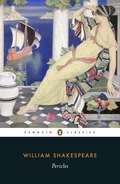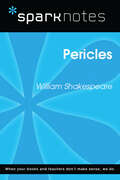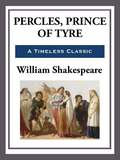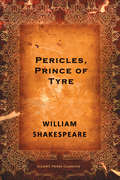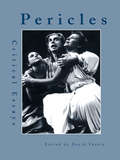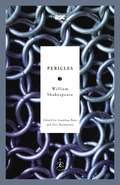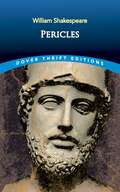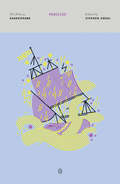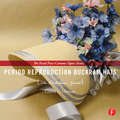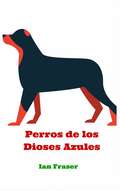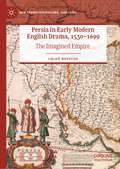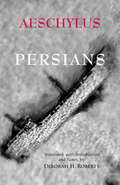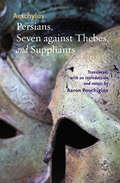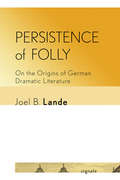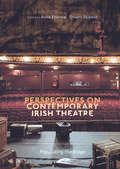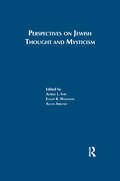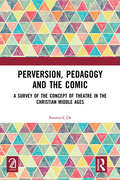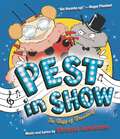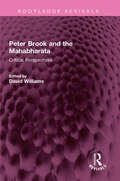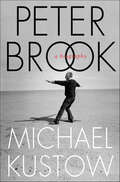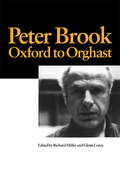- Table View
- List View
Pericles
by William ShakespearePericles, Prince of Tyre, must solve a riddle in order to marry the daughter of the King of Antioch, or be put to death. But when the answer reveals a horrific secret, the young man faces his greatest dilemma. Danger and adventure follow as Pericles flees the city to find his fortune elsewhere, in a romantic drama of families lost and reunited, evil punished and virtue rewarded.
Pericles (SparkNotes Literature Guide Series)
by SparkNotesPericles (SparkNotes Literature Guide) by William Shakespeare Making the reading experience fun! Created by Harvard students for students everywhere, SparkNotes is a new breed of study guide: smarter, better, faster. Geared to what today's students need to know, SparkNotes provides: *Chapter-by-chapter analysis *Explanations of key themes, motifs, and symbols *A review quiz and essay topicsLively and accessible, these guides are perfect for late-night studying and writing papers
Pericles (The New Cambridge Shakespeare)
by William Shakespeare edited by Doreen DelVecchio Antony HammondOver the past two decades there has been a resurgence of theatrical interest in Shakespeare's Pericles, which has been rescued from comparative neglect and is now frequently performed. This development is charted in the introduction to this edition, which differs radically from any other currently available. Doreen DelVecchio and Antony Hammond reject the critical orthodoxies of a corrupt text and divided authorship. Instead they show the play to be a unified aesthetic experience. The result is a more enthusiatic view of Pericles than that of other editions.
Pericles, Prince of Tyre
by William ShakespearePerhaps one of Shakespeare's most adventure-filled plays, "Pericles" follows the extended sailing journeys of a young prince. Pericles is forced to flee Antioch when he correctly guesses a riddle that reveals the incestuous activity of King Antiochus. Unable to stay at home in Tyre because of Antiochus' vengeance, he sails away and ends up shipwrecked in Pentapolis, where he fights for and wins a princess named Thaisa. The trials and tribulations of this couple and their daughter Marina fill the remaining acts of "Pericles" with grief and trepidation, as well as joy and a truly heartwarming reunion. A laudable component of Shakespeare's collection of plays, "Pericles, Prince of Tyre" is a compelling story of family and struggle that resonates with readers even today.
Pericles, Prince of Tyre
by William ShakespeareAfter Prince Pericles puzzles out a terrible secret about the king of Antioch, he flees the city and sets sail on his ship. His adventures bring him love and marriage, but his greatest tragedies and triumps lay ahead as he voyages home.
Pericles: Critical Essays (Shakespeare Criticism #Vol. 23)
by David SkeelePericles: Critical Essays brings together the most essential critical essays and theatrical reviews of Shakespeare's play from the late 17th century to the present, providing a representative gathering of critical opinion of Pericles over the centuries. David Skeele's introduction identifies the critical issues and problems the play has raised, cites and evaluates significant critical works, and gives readers a guide to research on the play.
Pericles: Prince Of Tyre (Modern Library Classics)
by William Shakespeare Jonathan Bate Eric Rasmussen"This world to me is but a ceaseless storm Whirring me from my friends." --Pericles Eminent Shakespearean scholars Jonathan Bate and Eric Rasmussen provide a fresh new edition of this classic tragicomedy of good and evil in many guises. THIS VOLUME ALSO INCLUDES MORE THAN A HUNDRED PAGES OF EXCLUSIVE FEATURES: * an original Introduction to Pericles * incisive scene-by-scene synopsis and analysis with vital facts about the work * commentary on past and current productions based on interviews with leading directors, actors, and designers * photographs of key RSC productions * an overview of Shakespeare's theatrical career and chronology of his plays Ideal for students, theater professionals, and general readers, these modern and accessible editions from the Royal Shakespeare Company set a new standard in Shakespearean literature for the twenty-first century.From the Trade Paperback edition.
Pericles: With The Story Of The Prince Of Tyre... . (Dover Thrift Editions)
by William ShakespeareThis romantic drama portrays the travails of a wandering prince and the redemptive powers of a daughter's love. Driven from one end of the Mediterranean to another by the winds of fate, Pericles endures loss and heartbreak before his odyssey ends in a miraculous reunion. Shipwreck, famine, and other disasters punctuate this wondrous tale, in which a knight in rusty armor fights for his true love and a princess kidnapped by pirates retains her honor by setting a virtuous example for her captors.Prologues delivered in the character of medieval English poet John Gower introduce each act of this unusual play, whose authorship has long been disputed. Written late in Shakespeare's career, Pericles was enormously popular in the seventeenth century and was the first of the playwright's dramas to be staged after the Restoration. The play fell into neglect until recent years, and now its charms are being rediscovered by modern audiences.
Pericles: With The Story Of The Prince Of Tyre... . (The Pelican Shakespeare)
by William ShakespeareThe acclaimed Pelican Shakespeare series edited by A. R. Braunmuller and Stephen Orgel The legendary Pelican Shakespeare series features authoritative and meticulously researched texts paired with scholarship by renowned Shakespeareans. Each book includes an essay on the theatrical world of Shakespeare’s time, an introduction to the individual play, and a detailed note on the text used. Updated by general editors Stephen Orgel and A. R. Braunmuller, these easy-to-read editions incorporate over thirty years of Shakespeare scholarship undertaken since the original series, edited by Alfred Harbage, appeared between 1956 and 1967. With definitive texts and illuminating essays, the Pelican Shakespeare will remain a valued resource for students, teachers, and theater professionals for many years to come. For more than seventy years, Penguin has been the leading publisher of classic literature in the English-speaking world. With more than 1,700 titles, Penguin Classics represents a global bookshelf of the best works throughout history and across genres and disciplines. Readers trust the series to provide authoritative texts enhanced by introductions and notes by distinguished scholars and contemporary authors, as well as up-to-date translations by award-winning translators.
Perilous Passions: Ethics and Emotion in Early Modern Spain (Toronto Iberic #87)
by Hilaire KallendorfCan feelings be wrong? Scientists agree that emotions contain both a cognitive and a physiological component. The cognitive part can be modified, while the physiological response is largely involuntary. In religious terms, the answer is clear in its legislation of heart motives: love your enemies, lust is equivalent to adultery, hate is the same thing as murder. In Perilous Passions, Hilaire Kallendorf draws on early modern Spanish theatre to reveal how emotions have always been understood as central to ethics. Starting with a treatise on emotion, On the Passions of the Soul by Juan Luis Vives (1493–1540), Kallendorf uses pairs of opposing emotions – love/hatred, desire/aversion, joy/sorrow, hope/despair, and courage/fear – to explore how they are depicted in Golden Age plays. The book pinpoints and probes intersections of feelings with morality. It asks: Do emotions bear positive or negative ethical overtones? Which emotions are more conducive to virtue? Are passions perceived as perilous in early modern Spain, in agreement with Neostoic principles? Or does the Catholic liturgy’s emphasis on involving the corporeal senses in worship mean that bodily sensations, including feelings, are accorded pride of place – especially in drama? In asking these questions, Perilous Passions argues for the significance of theatre in emotional education.
Period Reproduction Buckram Hats: The Costumer’s Guide (The Focal Press Costume Topics Series)
by Crystal G. HermanWhether you’re in a professional or a community theatre, part of a historical re-enactment, or teaching costume construction, a well-made hat provides a much-needed finishing touch to a costume. Period Reproduction Buckram Hats: The Costumer’s Guidebook is your one-stop resource for learning how to recreate historically accurate buckram hats. Each chapter is devoted to the construction of a particular hat, beginning with a historical image and followed by an list of the exact amount of fabric, tools, and materials needed and the estimated time to complete the construction. Every chapter contains a brief historical background on each hat, a pattern, step-by-step instructions, process photographs, and ideas for altering the pattern to fit your unique production. This book not only provides instruction for the exacting reproduction of historic hats, but it also guides and encourages you to alter patterns and techniques to create your own designs. The final chapters outline general millinery principles that can be applied to almost any hat, allowing you to customize your project.
Perros de los Dioses Azules
by Mara Doménech De Seingalt Ian FraserEsta entrañable obra de teatro, hecha tanto para jóvenes como para adultos, enseña el valor de la libertad a través de unos perros policías entrenados para atacar. Esta obra sirve de metáfora sobre la verdadera libertad, la que se elige, y aquella que viene impuesta. Una magnífica obra de teatro, ocurrente, simpática y que al mismo tiempo que hace reflexionar sobre la libertad, ya sea nuestra o de cualquier animal, ofrece unos momentos divertidos sin dudarlo.
Persia in Early Modern English Drama, 1530–1699: The Imagined Empire (New Transculturalisms, 1400–1800)
by Chloë HoustonThis book is a study of the representation of the Persian empire in English drama across the early modern period, from the 1530s to the 1690s. The wide focus of this book, encompassing thirteen dramatic entertainments, both canonical and little-known, allow it to trace the changes and developments in the dramatic use of Persia and its people across one and a half centuries. It explores what Persia signified to English playwrights and audiences in this period; the ideas and associations conjured up by mention of ‘Persia’; and where information about Persia came from. It also considers how ideas about Persia changed with the development of global travel and trade, as English people came into people with Persians for the first time. In addressing these issues, this book provides an examination not only of the representation of Persia in dramatic material, but of the broader relationship between travel, politics and the theatre in early modern England.
Persians (Hackett Classics)
by AeschylusThe only surviving play of Aeschylus to be based on a historical event—the Greek victory at Salamis just a few years before the play was written—Persians appears in Deborah H. Roberts' brilliant new verse translation accompanied by her Introduction, Notes, Maps, and Chronology. Also included are newly translated excerpts from Herodotus&’ Histories that should fascinate any reader of the play.
Persians, Seven against Thebes, and Suppliants (Johns Hopkins New Translations from Antiquity)
by AeschylusAaron Poochigian’s new translations of Aeschylus’s earliest extant plays provide the clearest rendering yet of their formal structure. The distinction between spoken and sung rhythms is as sharp as it is in the source texts, and for the first time readers in English can fully grasp the balanced, harmonious arrangement of choral odes. The importance of these works to the history of drama and tragedy and to the history of classical literature is beyond question, and their themes of military hubris and foreign versus native are deeply relevant today. Persians offers a surprisingly sympathetic portrayal of the Athenians’ most hated enemy; in Seven against Thebes Argive invaders, though no less Greek than the Thebans themselves, are portrayed as barbarians; and in Suppliants the city of Argos is called upon to protect Egyptian refugees. Based on textual evidence and the archaeological remains of the Theater of Dionysus at Athens, Poochigian’s introductory overview of stage properties and accompanying stage directions allow readers to experience the plays as they were performed in their own time. He is most careful in his translations of the plays’ choral odes. Instead of rendering them with little or no form, Poochigian has preserved the comprehensive structures Aeschylus himself employed. Readers are thus able to recognize Aeschylus as a master of poetry as well as of drama. Poochigian’s translations are the most accurate renditions of the poetry and dramaturgy of the original works available. Intended to be both read as literature and performed as plays, these translations are lucid and readable, while remaining staunchly faithful to the texts.
Persistence of Folly: On the Origins of German Dramatic Literature (Signale: Modern German Letters, Cultures, and Thought)
by Joel B. LandeJoel B. Lande’s Persistence of Folly challenges the accepted account of the origins of German theater by focusing on the misunderstood figure of the fool, whose spontaneous and impish jest captivated audiences, critics, and playwrights from the late sixteenth through the early nineteenth century. Lande radically expands the scope of literary historical inquiry, showing that the fool was not a distraction from attempts to establish a serious dramatic tradition in the German language. Instead, the fool was both a fixture on the stage and a nearly ubiquitous theme in an array of literary critical, governmental, moral-philosophical, and medical discourses, figuring centrally in broad-based efforts to assign laughter a proper time, place, and proportion in society.Persistence of Folly reveals the fool as a cornerstone of the dynamic process that culminated in the works of Lessing, Goethe, and Kleist. By reorienting the history of German theater, Lande’s work conclusively shows that the highpoint of German literature around 1800 did not eliminate irreverent jest in the name of serious drama, but instead developed highly refined techniques for integrating the comic tradition of the stage fool.
Perspectives on Contemporary Irish Theatre
by Anne Etienne Thierry DubostThis book addresses the notion posed by Thomas Kilroy in his definition of a playwright's creative process: 'We write plays, I feel, in order to populate the stage'. It gathers eclectic reflections on contemporary Irish theatre from both Irish theatre practitioners and international academics. The eighteen contributions offer innovative perspectives on Irish theatre since the early 1990s up to the present, testifying to the development of themes explored by emerging and established playwrights as well as to the (r)evolutions in practices and approaches to the stage that have taken place in the last thirty years. This cross-disciplinary collection devotes as much attention to contextual questions and approaches to the stage in practice as it does to the play text in its traditional and revised forms. The essays and interviews encourage dialectic exchange between analytical studies on contemporary Irish theatre and contributions by theatre practitioners.
Perspectives on Jewish Though
by IvryFirst Published in 1998. Routledge is an imprint of Taylor & Francis, an informa company.
Perversion, Pedagogy and the Comic: A Survey of the Concept of Theatre in the Christian Middle Ages
by Soumick DePerversion, Pedagogy and the Comic studies how the idea-of-theater shaped western consciousness during the Christian Middle Ages. It analyses developments within western philosophy, Christian theology and theater history to show how this idea realized itself primarily as a metaphor circulating through various discursive domains. Beginning with Plato’s injunction against tragedy the relation between philosophy and theater has been a complicated affair which this book traces at the threshold when the western world became Christian. By late antiquity as theatre was slowly banned, Christian theology put the idea-of-theatre to use in order to show what they understood to be the perverted nature of worldly existence and the mystery of the Kingdom of God. Interrogating the theological teachings of some of the early Church Fathers like St Augustine, Tertullian and Clement of Alexandria the book offers a new look at how the idea of theater not only inspired Christian liturgical practices but Christian pedagogy in general which in turn shaped the nature of Christian religious drama. Finally the author tries to demonstrate how this hegemonic use of the theatre-idea was countered by a certain comic sensibility which opened the idea of theatre in the Christian Middle Ages to a new and subversive materialist possibility. Please note: Taylor & Francis does not sell or distribute the Hardback in India, Pakistan, Nepal, Bhutan, Bangladesh and Sri Lanka.
Pest In Show
by Victoria JamiesonLadybug knows she was born to be a star. She can't wait to sing and dance in her newest musical, which will be her best show ever. Ladybug won't let anyone get in the way of her performance...especially her little brother, Fly. He's a pest! But Fly is determined to be part of the act, no matter what. Is the show big enough for this sibling rivalry?This sing-along, read-aloud, funny tribute to the budding Broadway star in all of us is sure to be a smash hit, and shows that working together really does pay off.
Peter Brook and the Mahabharata: Critical Perspectives (Routledge Revivals)
by David WilliamsFirst published in 1991, Peter Brook and the Mahabharata is a collection of essays which contextualizes the production of Peter Brook’s The Mahabharata. Written by both scholars and collaborators on Brook’s production, these essays seek not only to discuss such issues as the politics of theatre interculturalism, but to describe the nature of the working process, and detail the technical problems engendered by touring a production of this size and complexity. Furnished with a new preface by the editor, the book continues to be crucial research work devoted to unravelling the mesmerising as well as the polarising enigma known as Peter Brook’s The Mahabharata. Thoroughly heterogenous and controversially irreverent, this book will be of interest to students of theatre, performance art, literature, South Asian studies and media studies.
Peter Brook: A Biography
by Michael KustowPeter Brook is one of the world's legendary theater directors. His productions are a byword for imagination, energy, and innovation. From his ground-breaking production of Marat/Sade, to his "white box" A Midsummer Night's Dream, to his monumental staging of The Mahabharata and beyond, Brook has always been the pioneer of what a director and a company of actors can conjure out of an empty stage. In this first authoritative biography, arising out of an association and friendship with Brook over forty years, Michael Kustow tells the fascinating and revealing story of a man whose life has been a never-ending quest.Born into a Russian émigré family in London, Brook has been fascinated by theater and film since childhood. He studied at Oxford, where he made a film of Laurence Sterne's A Sentimental Journey and was almost sent down during his turbulent undergraduate years. As a brilliant young man influenced by the theatrical visionary Gordon Craig, he turned his hand to Shakespeare, opera, new French drama, and mainstream comedy. Following Craig's philosophy, Brook began to search for a simplicity, harmony, and beauty that would incorporate all aspects of the stage production under the control of one person. He also began the lifelong search for authenticity on the stage, a search that led him around the world from London to New York, to his legendary Théâtre des Bouffes du Nord in Paris, to Broadway and the Brooklyn Academy of Music. It was in Paris, in the 1970s, that he attempted to discover a universal language of theater with an international group of actors. This collaboration resulted in a series of visually spectacular and innovative shows including The Ik,The Conference of the Birds, and The Mahabharata.In his long and influential career, he worked with some of the world's greatest actors and writers including Glenda Jackson, Paul Scofield, John Gielgud, Laurence Olivier, Irene Worth, Jeanne Moreau, Peter Weiss, and Truman Capote. His films, such as Lord of the Flies,Moderato Cantabile, King Lear (with Paul Scofield), The Beggar's Opera, and the film of Marat/Sade moved the camera and the screen to borders they had not reached before. His book The Empty Space continues to be one of the classic works on theater and drama in the Western canon and his memoir, Threads of Time, gave us a glimpse into his personal development. In this biography, based on extensive interviews with Peter Brook and many of the actors, writers, producers, and directors he's worked with throughout his life, Michael Kustow goes to the heart of Brook's theater, his self-searching and his unceasing desire to produce work that redefines theater and life.
Peter Brook: Oxford To Orghast To India
by R. Helfer G. LoneyPeter Brook is known internationally as a theatre visionary, and a daring experimenter on the cutting-edge of performance and production. This book concentrates on Brook's early years, and his innovative achievements in opera, television, film, and the theatre. His productions are viewed separately, in chronological order, suggesting Brook's developing and changing interests. The authors include thought-provoking interviews with Brook (and with numerous outstanding artists who have worked with him) and bring to the reader penetrating critiques of Brook's theories and practices as a man of the theatre.
